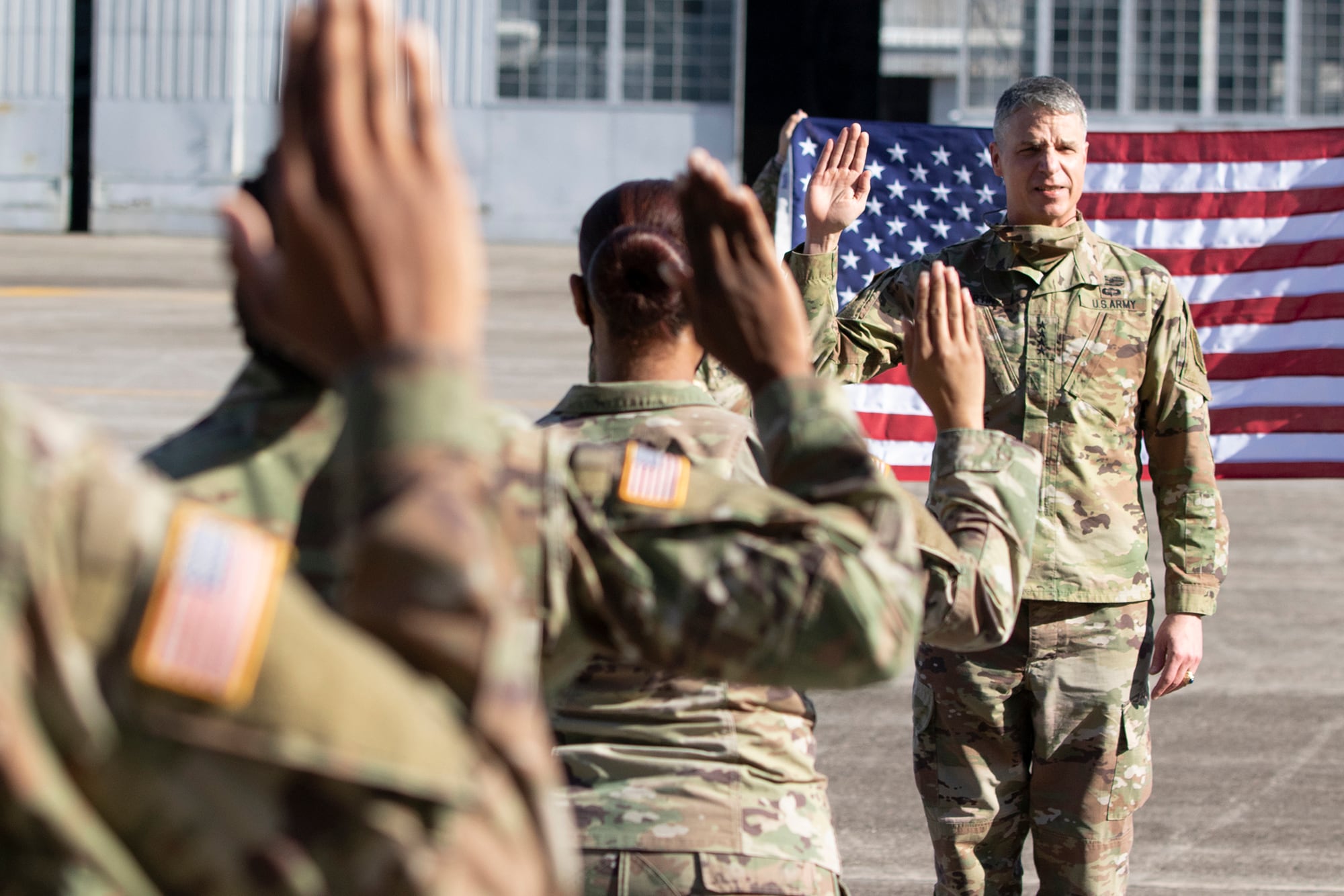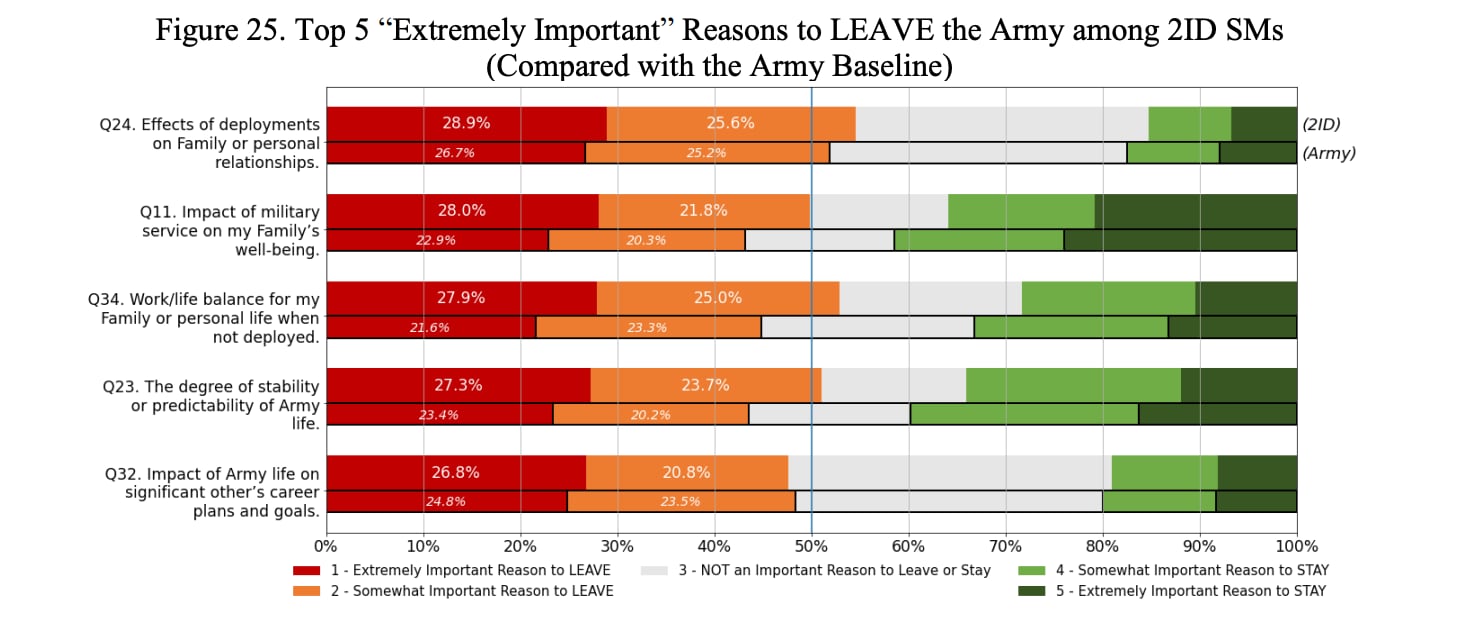The Army released the results of a new annual exit survey on Nov. 19, revealing why soldiers opted to leave the Army in recent years. But this survey is different than other exit surveys, Army officials said, because it also asks soldiers opting to remain in uniform why they’re staying.
The new and improved Department of the Army Career Engagement Survey, or DACES, also will allow Army leaders to anonymously track the reasons why soldiers stay in the active-duty force throughout their careers. Troops receive an annual invitation to complete the DACES questionnaire during their birth month, and they also receive an invitation 180 days before their separation date.
The survey was a major effort of the Army’s Talent Management Task Force, according to Army releases.
“DACES provides objective information from thousands of Soldiers,” said the task force’s director, Brig. Gen. Brett Funck. “The Army can analyze this information to gain a rich understanding of how Soldiers feel and what their future potential decisions are based on.”
The results were briefed to top Army leaders in recent months, according to an Army official involved with DACES. It’s not yet clear whether any new policies or initiatives will immediately emerge from the project.
The Army plans to use the data to improve quality of life, the release added.
Why soldiers leave the Army
According to nearly 38,000 troops whose surveys were analyzed, the top reasons for leaving the Army were related to their families. But even considering those factors, the Army’s retention is strong — the service retained nearly 2,000 more troops than its fiscal 2021 retention goal.
RELATED

Surveyed troops said these were the top five reasons for leaving the Army. The percentages indicate how many soldiers felt the factors were “extremely” or “somewhat” important to their decisions:
- Effects of deployments on family or personal relationships — 51.9%
- Impacts of Army life on significant other’s career plans and goals — 48.3%
- Impacts of Army life on family plans for children — 47.2%
- The degree of stability or predictability of Army life — 43.6%
- Impact of military service on my family’s wellbeing — 43.2%
The survey also highlights trends among demographic groups in their reasons to leave.
Junior officers were more likely to report wanting to leave the Army due to work-life balance issues that impacted their families. And women were more concerned than men about how military life was impacting their ability to start a family.
Junior enlisted soldiers were more likely to report that perceived unfairness in promotions had contributed to their decision to leave the service.
Why troops choose to stay in
Surveyed troops said these were the top five reasons for staying in the Army. The percentages indicate how many troops felt the factors were “extremely important” to them:
- Opportunity to serve my country — 53.5%
- How well my retirement pay or benefits will meet my future needs — 45.1%
- Opportunities to lead or train soldiers — 43.5%
- My sense of purpose — 38.1%
- How well my pay or benefits meet my present needs — 37%
Senior officers were more influenced than other groups by their retirement pay and benefits, as well as their “sense of purpose.” More than half — 50.9% of senior officers — said their purpose was an “extremely important” reason to stay in uniform.
Black and Hispanic servicemembers, as well as junior enlisted troops, identified educational benefits as a reason to stay in the Army at a higher rate than other demographic groups.
What else does the report show?
The DACES report also shows a few examples of how Army leaders can filter and analyze the data based on the respondents’ job, families, duty station or other factors.
Soldiers in the 2nd Infantry Division, for example, were more likely than the Army baseline to identify “the effects of deployments on family or personal relationships” or work/life balance outside of deployments as reasons to leave the service.

The report also shows that Army aviation officers and warrant officers are more likely to cite “quality of life” as a reason to get out.
Aviation officers are also less likely to be worried about civilian career opportunities should they leave.
Army officials hope these data analytics will “empower” leaders to make policy decisions and tailor initiatives in order to improve retention and quality of life, according to the release.
Davis Winkie covers the Army for Military Times. He studied history at Vanderbilt and UNC-Chapel Hill, and served five years in the Army Guard. His investigations earned the Society of Professional Journalists' 2023 Sunshine Award and consecutive Military Reporters and Editors honors, among others. Davis was also a 2022 Livingston Awards finalist.





